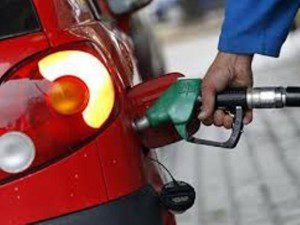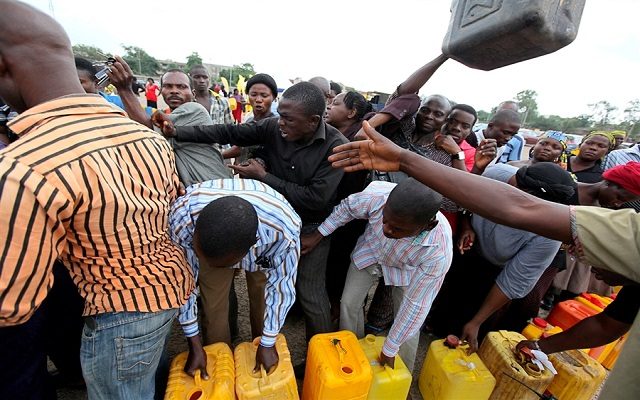National Issues
Petrol Price Hike: Avoiding the Mistakes of 2012 -By Khalifa Musa Muhammad
In 2012 one of the reasons why the Jonathan administration faced the backlash was because of poor communication. The government failed to effectively communicate to the people the benefits of petrol subsidy removal. Subsidy payment was gulping 33 per cent of net revenues and this was unsustainable. President Jonathan spearheaded the Economic Management Team and the team agreed to enlighten Nigerians about the burden of the subsidy and how money saved could be used judiciously.

The average Nigerian dreads the increase in the pump price of petrol. Firstly, the cost of transportation will soar and transportation plays a very crucial role in the supply chain network of goods and services. So, from their scarce resources Nigerians will be forced to spend more and further tighten their purse. Secondly, the increase annoys Nigerians because the country is amongst the largest oil producing nations. Yet there is a limited refining capacity of crude oil – only if the amount supplied exceeds demand then the price will go down. This is a fundamental economic principle.
During the launching of the November 2021 Nigeria Development Update (NDU) by World Bank titled “Time for Business Unusual”. The Group Managing Director (GMD) of Nigerian National Petroleum Company Limited (NNPC), Mele Kyari said that petrol might rise up to 340 naira per litre come February 2022. This is because by then the federal government must have phased out the payment of petrol subsidy. The subsidy removal is now legally backed by the recently passed Petroleum Industry Act (PIA). Currently, the price of petrol is 165 naira per litre.
The last time there was this monumental increase in the pump price of petrol was on 1 January 2012. President Goodluck Ebele Jonathan (GEJ) announced the increment in his New Year message from 65 naira to 141 naira. This resulted in widespread protest across the country. The then administration had to back down and reach a compromise of 97 naira with labour organizations. In addition, the administration established the Subsidy Reinvestment and Empowerment Programme (SURE-P). SURE-P was to oversee the investment of the saved resources in transportation, health and job creation amongst others.

In 2012 one of the reasons why the Jonathan administration faced the backlash was because of poor communication. The government failed to effectively communicate to the people the benefits of petrol subsidy removal. Subsidy payment was gulping 33 per cent of net revenues and this was unsustainable. President Jonathan spearheaded the Economic Management Team and the team agreed to enlighten Nigerians about the burden of the subsidy and how money saved could be used judiciously.
December 2011 to March 2012 was slated to enlighten the public about the benefits of subsidy removal. This measure was to avoid or lessen backlash. Government never goes unscathed as a result of petrol price increase. After the slated enlightenment period, by April 2012 the government will now announce the increment. Unfortunately, the governors pressured Jonathan to phase the subsidy in his New Year message to Nigerians. It turned out to be bad advice and the governors failed to show GEJ support when he needed it – they fizzled out. Just like how the Dothraki cavalry charge disappeared at the Battle of Winterfell in the television series Game of Thrones.
The President Muhammadu Buhari (PMB) led administration seems to have taken some lessons. After announcing the anticipated hike, Kyari argued that the subsidy costs the government about 243 billion naira monthly. Therefore by removing petrol subsidy, the government will use the saved funds to cater for the people. The Governor of Kaduna State, Malam Nasir El-Rufai, joined the presentation and added that if the subsidy is not removed 35 of the 36 states will be unable to pay salaries.
Furthermore, the Minister of Finance, Zainab Ahmed, spoke at the event and stated that the federal government will pay 5,000 naira to between 30 to 40 million Nigerians to cushion the effect of the subsidy removal. The payment of 5,000 naira to 40 million Nigerians amounts to 200 billion monthly. This indicates that only about 25 per cent of the subsidy funds will be saved for further investments.
This government has ambitious social protection programs but there are question marks about the beneficiaries. Gathering relevant and accurate data on the target beneficiaries of the transportation grant will not be easy. Such activities are usually hijacked and this results to the exclusion of the targets making the endeavour to be in vain.
The NDU revealed that the poorest 40 per cent of the population consumes not up to three per cent of the total petrol in Nigeria. This shows that it is the rich that benefits most from the subsidy. Actually, the subsidy helps to reduce transportation cost but it makes economic sense to remove it. Nevertheless, every economic decision has political implications. This is where political activities will become interesting. The opposition parties will now make promises by offering “better” alternatives than the ruling party. Nigerians should scrutinize whatever the politicians are presenting so that they do not easily get deceived.
One of the highlights of the NDU is removal of subsidy on petroleum products. The World Bank expects that it will help revamp the economy. From the pronouncements at the event one can tell that the government seems to be heeding to the call. This is not a coincidence. This World Bank update is one of the many events that the government will leverage upon to intimate Nigerians about subsidy removal.
The economy is one of the three critical areas the All Progressive Congress (APC) promised to focus on. Nigeria’s revenue generation relies heavily on the oil and gas sector. This sector has a key role to play in revamping and diversifying the economy. Hopefully, the passage of the PIA will help to restructure and sanitise the oil and gas sector to stimulate economic growth.
Recently, the Minister of State for Budget and National Planning, Prince Agba, stated that the non-oil sector contributes 65 per cent to the economy. This is commendable but still other promises have not been met. In 2018 the Brookings Institution labelled Nigeria as the poverty capital of the world. Today, the poorest of the poor in Nigeria are further impoverished by the incessant rise of insecurity. Inflation rate is hovering around 16 to 17 per cent. I doubt if subsidy removal will lower inflation. To compound all these issues the naira seems to be on a banana peel.
PMB’s integrity has always been a selling point for him in his public service and political career. Nigerians have not forgotten about his promises and the buck stops at his desk. Nigerians should be properly enlightened about the benefits of subsidy removal. Also, the distribution of transportation grants should be handled in a transparent manner. PMB should ensure that the target beneficiaries benefit majorly from his social investment programs. It is not late to consult Senator Kwankwaso on how he ensured that the masses were the main beneficiaries from his scholarship programs.
El-Rufai’s statements show that the governors are fully backing the hike. The purported removal of subsidy has forced labour organizations to release statements stressing that their demands must be met. Now the government has a clue on how labour will react to the hike. As things are going, I doubt if there will be widespread backlash like in 2012. Except if the opposition fuels and charges the political atmosphere. All that matters is doing the right thing and making Nigeria work. Posterity will always judge and history is on the side of the oppressed. Long live Nigeria.
Khalifa Musa Muhammad a public affairs analyst from Kaduna State.




















